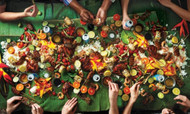Things You Should Know About Filipino Culture
Posted by Maris on 6th May 2024
What distinguishes the Philippines from the other countries in the world? To start with, everything revolves on their customs and culture. The following 11 facts about Filipino culture will help you understand how they differ from the cultures of other countries. These should not be interpreted as stereotypes, but rather as distinctive qualities shared by Filipinos.
Filipinos have a strong sense of resilience.

When disasters strike, Filipinos always find a way to overcome the situation. Rather than moping, they are able to get back up and smile. They frequently encourage one another and speak lovely Filipino phrases to one another.
Family comes first in the Philippines. You are therefore considered as a family member regardless of whether you are a member of the immediate family or if you are in the third or fourth generation. Even the closest of friends can occasionally be seen as family.
Filipinos follow a strict religion.

A Filipino home is replete with ostentatious pictures of crosses and other religious artifacts in every corner. Filipinos typically attend church on Sundays, sometimes even two or three times a week.
The people of the Philippines are highly courteous.

Using these two catchphrases, po and opo, which finish sentences while speaking to elders, kids are trained to be courteous from the moment they are born. They practice pagmamano, a custom in which they show respect for their elders by raising the backs of their palms to their foreheads. Given their rich linguistic heritage, you should carefully examine whether the things you say to and about the Filipino people are respectful of them when it comes to what not to say in the Philippines.

Filipinos support one another.

Filipinos, sometimes referred to as bayanihan, lend a hand to one another without asking anything in return, making it much easier for them to complete jobs and responsibilities. This is sometimes referred to as "community spirit." They will therefore put in extra effort and try their best to assist you if you learn a few travel terms to go about the Philippines.
Filipinos are culturally and traditionally sensitive.

Traditions inside the family and at home are significant to Filipinos. Typically, they reserve a certain day for a celebration, such as a reunion, festival, or birthday party. Of all, the main purpose of every get-together is to stay in touch over delicious cuisine.
Filipinos enjoy having parties.

Indeed, Filipinos enjoy throwing fiestas and celebrations. There is the MassKara Festival in Bacolod, the Kadayawan Festival in Davao, and the Moriones Festival in Marinduque.
Filipinos celebrate Christmas for the longest time ever.

It is a necessary to attend both local and major traditional events in the Philippines. In the Philippines, you can hear Christmas tunes and jingles being played in restaurants and shopping centers as early as August. There's a festive vibe, with lots of people shopping and having a wonderful time. Holiday festivities continue throughout the first or second week of January. We adore the holiday season, and among the several Filipino celebrations that you should at least once in your life experience is the Christmas festival.
Filipinos enjoy eating a lot.

Filipinos not only eat breakfast, lunch, and dinner, but also manage to fit in a small meal in between. They enjoy every piece of food, whether it is consumed every three hours or every hour. Yes, they really enjoy attending buffets!
Filipinos enjoy singing a much.
This explains why karaoke has grown so popular. Filipinos like spending time with their families and friends while they sing and perform both old and new music.
Filipinos have a passion for both architecture and art.

Just take a look at all the enormous, towering skyscrapers. Filipinos have a tendency to elevate both architecture and art to entirely new heights. They are passionate about everything unusual and distinctive, enjoy designing creatively, and have intuitive thinking skills. Speaking of which, we also do. In fact, we love the unexpected so much that we've put up a series of small-group excursions that celebrate everything from street food to regional traditions and customs.

